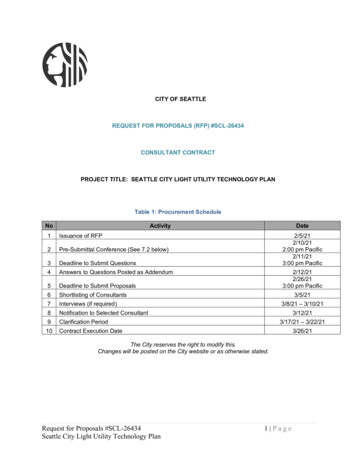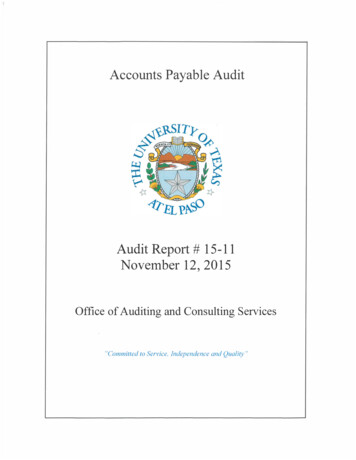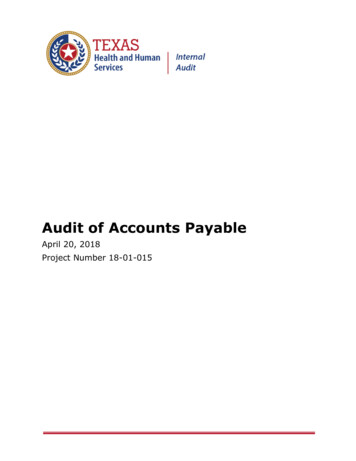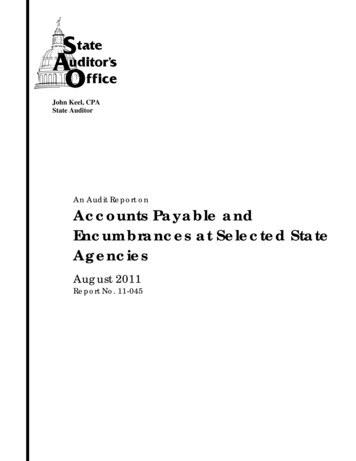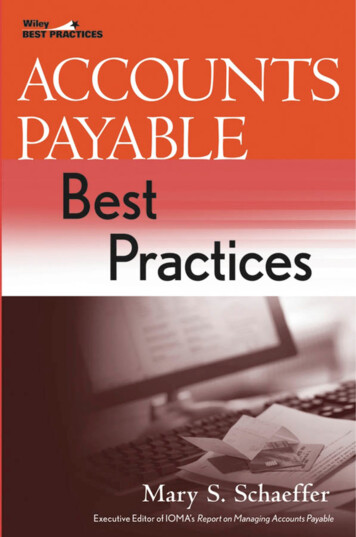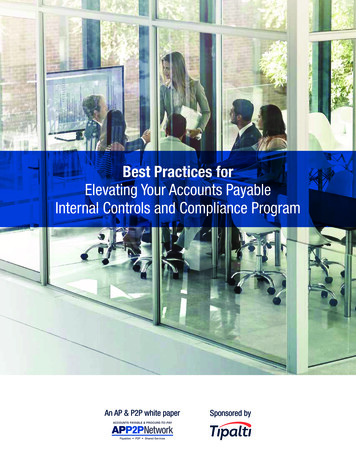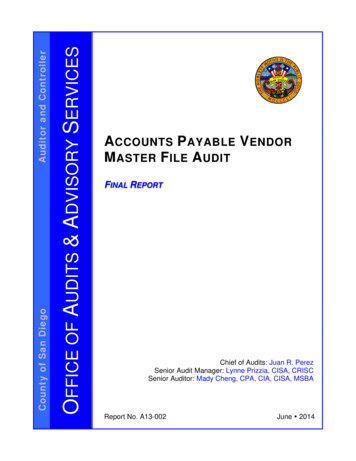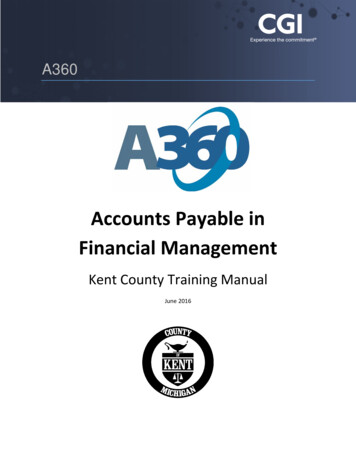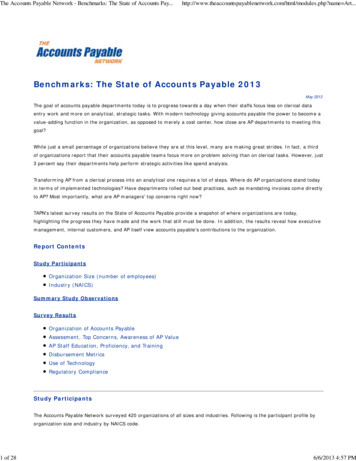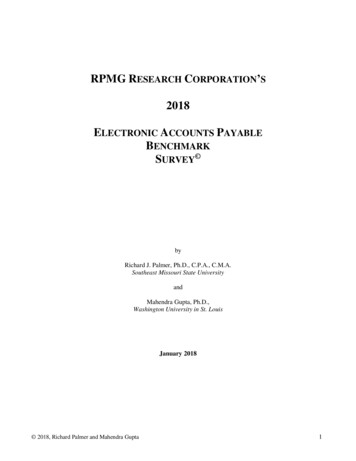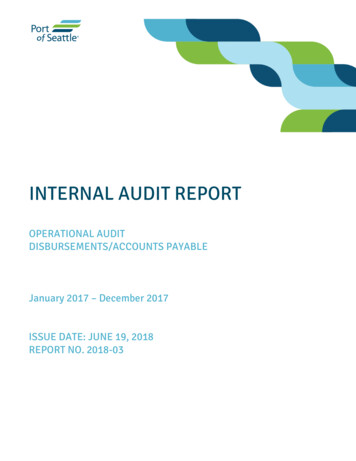
Transcription
INTERNAL AUDIT REPORTOPERATIONAL AUDITDISBURSEMENTS/ACCOUNTS PAYABLEJanuary 2017 – December 2017ISSUE DATE: JUNE 19, 2018REPORT NO. 2018-03
Disbursements/Accounts PayableJanuary 2017 – December 2017INTERNAL AUDITTABLE OF CONTENTSEXECUTIVE SUMMARY . 3BACKGROUND . 4AUDIT SCOPE AND METHODOLOGY . 5SCHEDULE OF FINDINGS AND RECOMMENDATIONS. 6APPENDIX A: RISK RATINGS . 10APPENDIX B: COMPLETE MANAGEMENT RESPONSE . 112
Disbursements/Accounts PayableJanuary 2017 – December 2017EXECUTIVE SUMMARYInternal Audit (IA) completed an audit of the Disbursements / Accounts Payable process within theAccounting and Financial Reporting Department (AFR) for the period January 1, 2017 through December31, 2017. The audit was performed to evaluate the design of internal controls and in some cases, theoperating effectiveness of those controls. Although considered, our audit was not designed to identifyfraud.AFR Management has a strong understanding and appreciation of effective internal controls. This “tone atthe top” mindset permeates to individuals performing key tasks within the disbursements process andcontributed to our evaluation and conclusions.In 2017, AFR processed over 14,000 vendor payments, totaling approximately 675 million. Paymentrequests are decentralized, originating mainly outside AFR. AFR processes Port payments, and is onecontrol component within the Port’s disbursements process. The decentralized nature of Portdisbursements requires controls to be developed and followed both within and outside AFR. Therefore,the collective efforts of these controls holistically contribute to the overall effectiveness of thedisbursements process.The issues identified align to best practices and are offered in the spirit of continuous improvement.1) A Port wide delegation of authority for approving invoice payments should be reviewed and approvedby Executive Management and memorialized into Executive Policy (EX-2) guidance. Delegations ofauthority establish approval limits that generally correlate to the individual’s level and responsibilitywithin the organization.2) Opportunities were identified to improve internal controls. These opportunities include, implementingcontrols to disable user access when no longer needed, validating the accuracy of invoices enteredinto PeopleSoft, and segregating the responsibility of adding and approving vendors. These changesto internal controls align to best practices and would further refine processes.These issues are discussed in more detail beginning on page six.We extend our appreciation to AFR, Central Procurement Office, and the Treasury Department for theirassistance and cooperation during the audit.Glenn Fernandes, CPADirector, Internal AuditRESPONSIBLE MANAGEMENT TEAMDan Thomas, Chief Financial OfficerRudy Caluza, Director Accounting and Financial ReportingDuane Hill, Senior Manager Disbursements3
Disbursements/Accounts PayableJanuary 2017 – December 2017BACKGROUNDThe Disbursements function within the Accounting and Financial Reporting Department (AFR) reviewssupporting documentation, general ledger coding, and enters invoice data into PeopleSoft.In early 2017, AFR began using COR360, a third party software designed to streamline and controlinvoice payments. COR360 gives employees, including those outside AFR, approval authority to requestpayment for invoices. The majority of department invoices, with the exception of Major Capital Projectsand Port Construction Services, use COR360. Invoices processed outside of COR360, are approvedmanually and stored in the Records Center on the Port of Seattle’s internal website (Compass).Accounts Payable (AP) Specialists create vouchers in PeopleSoft daily. These vouchers run through anovernight validation process and are posted for payment upon validation. Once in PeopleSoft, the Portuses two general methods to disburse funds (checks and electronic funds transfer). Live checks aregenerated and counted by an AP Specialist. A second individual (i.e. Travel Card Administrator or PayrollSenior Accountant) recounts and agrees the number of checks to the results from a PeopleSoft query.The table below reflects detail on the transaction type (method), amount, and count of disbursements forthe period January 1, 2017 through December 31, 2017:2017 DISBURSEMENTS BY TYPEMethodAmount% by AmountCount% by CountCheck 76,467,06811%6,17443%Electronic Payments*598,010,95689%8,13757% 674,478,024100%14,311100%TOTAL* Includes ACH, wire, and EFT4
Disbursements/Accounts PayableJanuary 2017 – December 2017AUDIT SCOPE AND METHODOLOGYWe conducted this performance audit in accordance with Generally Accepted Government AuditingStandards and the International Standards for the Professional Practice of Internal Auditing. Thosestandards require that we plan and perform the audit to obtain sufficient, appropriate evidence to providea reasonable basis for our findings and conclusions based on our audit objectives. We believe that theevidence obtained provides a reasonable basis for our findings and conclusions based on our auditobjectives.The period audited was January 2017 – December 2017. We used a risk-based approach from theplanning phase to the testing phase. We assessed risks and identified controls to mitigate those risks. Wegathered information through document requests, research, interviews, and observations. Our auditincluded the following procedures:Process Understanding Created flow charts to obtain a comprehensive understanding of the disbursements process.Identified risks and internal controls within the flow charts.Evaluated the design of internal controls to determine if control gaps existed.Control Testing1. COR360 Approval Hierarchy Reviewed the hierarchy for reasonableness and completeness. Walked through one transaction to determine whether the workflow process properlyfollowed the approval hierarchy.2. New Vendor Setup Approval Compared vendor addresses and phone numbers (if available), from PeopleSoft to payrollrecords, to identify matches. When matches were identified, we analyzed payments todetermine if they were appropriate. Selected 26 vendors judgmentally to determine whether they were registered with theappropriate State Department of Revenue.3. User Access Evaluated user roles, including vendor requests and approvals, within PeopleSoft.5
Disbursements/Accounts PayableJanuary 2017 – December 2017SCHEDULE OF FINDINGS AND RECOMMENDATIONS1) RATING: MEDIUMA Port wide delegation of authority for approving invoice payments should be reviewed andapproved by Executive Management and memorialized into Executive Policy (EX-2) guidance.Delegations of authorities establish approval limits that generally correlate to the individual’slevel and responsibility within the organization.Delegations balance the risk an organization is willing to grant to an employee’s level within theorganization, without compromising operational efficiencies. Generally, the higher the individual’sposition, the higher the amount an individual can authorize.Port Policy EX-2 includes “ limits of authority for conducting regular day-to-day business transactions.”EX-2, Attachment A, contains 16 Port wide delegation schedules. These schedules identify individualsauthorized to execute major construction contracts, small works contracts, and consulting agreements.The schedule also includes general positions that are authorized to enter into contracts for the purchaseof goods and services. EX-2 does not include an authorization schedule for payment approval.AFR management indicated that approval limits were established in COR360 by working with variousindividuals throughout the Port, thus the delegation of authority already exists.IA evaluated the limits and identified individuals, whose approval authority appeared excessive. Whendiscussed with the direct managers of these individuals, they concurred that the limits seemed excessive.Recommendations:1) Perform a reasonableness check, and if necessary, confirm with Senior Management that the limitsare accurate.2) Obtain CFO review and approval of the limits within COR360 and attach the approved schedule withinthe appendix of the EX-2 Policy.Management Action Plan:We acknowledge that the auditor recommendation enhances visibility in the control environment. Asrecommended, a higher Executive-level review and affirmation of payment authorization delegations willbe implemented, to augment department management authorized delegations. AFR will extract thepayment delegations currently contained in COR360 and incorporate them into the executive level EX-2delegation schedules. (Refer to Appendix B for complete response).DUE DATE: September 30, 20186
Disbursements/Accounts PayableJanuary 2017 – December 20172) RATING: MEDIUMOpportunities were identified to improve internal controls. These opportunities include,implementing controls to disable user access when no longer needed, validating the accuracy ofinvoices entered into PeopleSoft, and segregating the responsibility of adding vendors. Thesechanges to internal controls align to best practices and would further refine processes.1) User Access (As of March 2018)Thirty eight individuals within the Central Procurement Office (CPO) had the ability to enter new vendordata and request approval. We identified two individuals, whose access should have been removed, onewho transferred to a department outside of CPO and another whose access was no longer required toperform his job responsibilities.One hundred ninety six individuals had approval authority within COR360. We identified one individual,who was no longer an employee of the Port, but was not removed from the COR360 approval hierarchy.COR360 is a web-based application and does not require access to the Port’s network. Therefore, anindividual who no longer works for the Port who previously had a user name and password, could stilllogin to COR360.2) COR360 Invoice ValidationCOR360 Invoices are manually entered into PeopleSoft. A validation process does not exist to assurethat invoice details and amounts are entered correctly into PeopleSoft.3) New Vendor SetupIn certain instances, new vendors are added and approved within AFR. Although different individualsperform these functions, to align with industry standards, vendor setup should be restricted to CPO.Additionally, moving this control out of AFR allows CPO to focus on the vendor selection and approvalprocess and AFR to focus on the disbursement process.Recommendations:1) Perform a quarterly user access review to identify and remove access when an employee transfersdepartments or the need is no longer necessary (i.e. an employee’s employment terminates).2) Until an automatic feed can be developed, AFR should implement a control to validate the accuracy ofCOR360 invoices that are manually entered into PeopleSoft.3) Partner with CPO to assess controls and best practices for establishing and approving new vendors.This could also include transferring certain responsibilities to CPO, if necessary.Management Action Plan:1) As recommended, quarterly user access reviews will be put in place to identify and remove accesswhen an employee transfers departments or the need is no longer necessary. Further, AFR has put inplace a review against COR360 payment delegations, each time notice is received from HR that anemployee has terminated Port employment. This proactive step is consistent with existing controlprotocols AFR has in place to administer user access controls in the Port’s PeopleSoft payrolladministration and Concur travel/business expense systems.2) We will institute batch total controls between COR360 output and PeopleSoft Financials accountspayable system input, to validate completeness.7
Disbursements/Accounts PayableJanuary 2017 – December 20173) AFR will work in partnership with CPO to assess this change.DUE DATE: September 30, 20188
Disbursements/Accounts PayableJanuary 2017 – December 20171) EFFICIENCY OPPORTUNITYCOR360 was implemented, as a Port wide tool, to expedite invoice payments and to establish anapproval hierarchy within the application. However, not all groups use COR360 to processinvoices.AFR implemented COR360, as a Port wide paperless accounts payable electronic invoicing system. Thesystem was implemented to centrally receive, electronically scan, and approve vendor invoices moreefficiently, while supporting AFR’s goal to pay vendor invoices more timely by leveraging technology. Themajority of the Port, with approximately 320 users and 75 departments, use COR360.In June 2017, AFR met with Capital Development to discuss COR360. At that time, a decision was madeto postpone the use of COR360 until a deeper understanding of Capital Development business processeswas obtained. Invoices within Capital Development generally contain numerous pages of detail, arereviewed by multiple individuals, and are typically high amounts (exceeding 1 million).Management Action Plan:Management within Capital Development has agreed to have future discussions with AFR to exploreopportunities to leverage COR360.9
Disbursements/Accounts PayableJanuary 2017 – December 2017APPENDIX A: RISK RATINGSFindings identified during the course of the audit are assigned a risk rating, as outlined in the table below. Therisk rating is based on the financial, operational, compliance or reputational impact the issue identified has onthe Port. Items deemed “Low Risk” will be considered “Exit Items” and will not be brought to the final report.RatingFinancialInternal ControlsComplianceMissing, or inadequatekey internal controlsNoncompliancewith applicableFederal, State,and Local Laws,or Port PoliciesLarge financialimpactHIGHRemiss inresponsibilitiesof being acustodian ofpublic trustPartial controlsMEDIUMLOW/Exit ItemsEfficiencyOpportunityModeratefinancial impactNot adequate to identifynoncompliance ormisappropriation timelyInconsistentcompliance withFederal, State,and Local Laws,or Port PoliciesPublicHigh probabilityfor external auditissues and/ornegative publicperceptionPotential forexternal auditissues and/ornegative publicperceptionPort Commission/ManagementImportantRequires immediateattentionRelatively importantMay or may notrequire immediateattentionGenerallyLow probabilitycomplies withfor external auditFederal, State andLower significanceLow financialissues and/orLocal Laws or Portimpactnegative publicPolicies, but someMay not ate attentioncontrols could preventdiscrepanciesfuture problemsexistAn efficiency opportunity is where controls are functioning as intended; however, a modification would makethe process more efficientInternal controls in placebut not consistentlyefficient or effective10
Disbursements/Accounts PayableJanuary 2017 – December 2017APPENDIX B: COMPLETE MANAGEMENT RESPONSEFinding & Recommendation #1A Port wide delegation of authority for approving invoice payments should be reviewed and approved byExecutive Management and memorialized into Executive Policy (EX-2) guidance. Delegations of authorityestablish approval limits that generally correlate to the individual’s level and responsibility within theorganization.Management Response:As the auditor notes, current Port-wide documented delegations of authority reflect delegation schedulesthat identify individuals authorized to execute procurements, such as major construction contracts, smallworks contracts, consulting agreements and other purchases. Payments are at the end stream of theseapproved procurements and once the goods/services are received, the Port has a contractual obligationto make payment.There are payment controls inherent in the Port’s financial systems. The procurement process at thefront-end encompasses the Central Procurement Office (CPO) issuing purchase orders against whichapproved payments submitted to the Accounting & Financial Reporting (AFR) department forgoods/services received must match against key control criteria. If required criteria such as quantity, unitcost, amount and purchase order maximum amount of the approved procurements are not met, thepayment will be rejected by the PeopleSoft Financials system, regardless of whether payment approvalwas given. These payments represent at least 90% of payments made by AFR.In implementing COR360’s online workflow and electronic approval process, delegations of paymentauthority were established with the management of each respective Port department. Such managementauthorized delegations to initiate and approve payments are well documented and established in theCOR360 system. This is required for the system to administer the electronic workflow payment initiationand review/approval control points for each Port department. Through this implementation protocol,payment delegations of authority have been established involving the respective Port departmentmanagement.Nevertheless, we acknowledge that the auditor recommendation enhances visibility in the controlenvironment. As recommended, a higher Executive-level review and affirmation of payment authorizationdelegations will be implemented, to augment department management authorized delegations. AFR willextract the payment delegations currently contained in COR360 and incorporate them into the executivelevel EX-2 delegation schedules.While we agree with the recommendation, however, we respectfully ask how this rises to the level of anaudit finding. The recommendation forwards an observation to refine upon solid internal controls alreadyin place. Formal delegation of payment authority does exist, is established with each respectivedepartment’s management that is accountable for the operational oversight responsibility, is fullydocumented in the COR360 system, and is executed accordingly by the systems electronic workflow forall payment requests and approvals. Further, the delegation of authority is established throughappropriate department management, which conforms with internal control protocols that are required inorder for control points to be meaningful. They should rest with individuals at the appropriate levels of11
Disbursements/Accounts PayableJanuary 2017 – December 2017management having the necessary operational knowledge to effectively execute the expected judgmentand control. Formally adding the payment delegation schedule into EX-2 delegation process provides anenhancement for visibility at the executive level, but does not correct any internal controldeficiency. Formal delegation of authority for payments are established appropriately involvingmanagement in the respective Port departments.Finding & Recommendation #2Opportunities were identified to improve internal controls. These opportunities include, implementingcontrols to disable user access when no longer needed, validating the accuracy of invoices entered intoPeopleSoft, and segregating the responsibility of adding vendors. These changes to internal controlsalign to best practices and would further refine processes.Management Response:As a preface, we respectfully offer an overarching point in reference to the three opportunities forrefinements offered by the auditor. We value and embrace the recommendations. However, as a publicagency, it is impor
Jun 19, 2018 · Disbursements/Accounts Payable January 2017 – December 2017 . 4. The Disbursements function within the Accounting and Financial Reporting (AFR) reviewDepartments supporting documentation, general ledger coding, and enters invoice data into PeopleSoft. In early 2017, began AFR using COR360,
